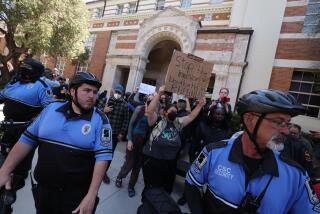Republicans Strike Back After Criticism of Bush’s Iraq Policy
As President Bush’s approval ratings decline, Republicans in Congress on Tuesday launched a campaign to counter Democratic criticism of the administration’s Iraq policy and to defend U.S. efforts to rebuild the war-scarred nation.
They orchestrated a series of blistering speeches on the Senate floor, lambasting Sen. Edward M. Kennedy (D-Mass.) for recently calling Bush’s Iraq policy a politically motivated “fraud.”
“There will come a time when Congress as a whole can determine the accountability for these operations, but at this time our focus should be behind our commander in chief, our president,” said Sen. John W. Warner (R-Va.), chairman of the Armed Services Committee.
Democrats angrily defended their right to question how Bush will use the billions of dollars he is seeking for combat and reconstruction.
The partisan fireworks obscure an underlying political and legislative reality: Bush is expected to get the full $87 billion he requested, as most Democrats -- including about half of those running for president -- are loath to take the political risk of voting against it.
Still, polls suggest that Bush might pay a political price for that victory: Public support for his Iraq policy has dropped since midsummer, and recent polls show overall approval of Bush’s performance dipping to its lowest level since he became president.
A recent survey by GOP pollster David Winston found that 49% of respondents approved of the job Bush was doing -- the first time Winston had registered Bush’s approval rating below 50%.
A new Gallup/CNN/USA Today poll found that the percentage of people who believed it was “worth going to war over” the situation in Iraq dropped to 50% in mid-September -- a fall of 8 percentage points in less than two weeks.
A survey released Tuesday by the Pew Research Center for the People and the Press found that 59% of those polled opposed Bush’s request for $87 billion. A new analysis by Democratic staff members of the House Budget Committee concluded that the long-term costs of the Iraq war and occupation will go far beyond that -- to as much as $417 billion over 10 years.
GOP officials say they are not worried about the slide in Bush’s approval ratings, arguing that a significant drop was inevitable given the stratospheric ratings he received after the Sept. 11 terrorist attacks.
“What we’re seeing now is not the sky falling,” said Christine Iverson, a spokeswoman for the Republican National Committee. “It is gravity.”
Even now, she said, Bush has stronger public support than former presidents Clinton and Reagan did at comparable periods in their first terms.
Others in the GOP are more cautious, saying the public opinion trends reflect a genuine political risk facing Bush and other Republicans.
“President Bush went into Iraq at his own political peril,” said Sen. Peter Fitzgerald (R-Ill.). “He’s acting like a leader, not like a politician.” But Fitzgerald predicted that Bush will still win reelection because voters will reward him for showing leadership.
To help shape public opinion, GOP congressional leaders are urging rank-and-file members to do more to promote Bush’s policies when they are home with their constituents. “We have 229 megaphones,” said a GOP leadership aide, referring to the number of Republicans in the House.
Republicans are trying to do more to tout accomplishments in Iraq -- such as infrastructure that has been repaired and regions that have been stabilized -- because such positive developments are often overshadowed in the media by reports of casualties and violence.
“The story has not been told,” said House Majority Leader Tom DeLay (R-Texas). “We’ve allowed the media just to focus on the bad things ... instead of telling the whole story.”
GOP leaders rose to defend the president with particular vehemence after Kennedy was quoted as saying, in an interview with Associated Press last week, that the decision to go to war was contrived to give Republicans a political boost.
“There was no imminent threat,” Kennedy said. “This was made up in Texas, announced in January to the Republican leadership that war was going to take place and was going to be good politically. This whole thing was a fraud.”
It was a particularly provocative statement; while many Democrats have criticized Bush’s performance and planning in Iraq, Kennedy struck more personally at the question of Bush’s credibility and his motivation for going to war.
Republicans responded that the charges were reckless and without factual basis. They noted that the policy of seeking regime change in Iraq has its roots not in Texas, but in Clinton’s presidency.
Sen. Robert F. Bennett (R-Utah) said that if Kennedy’s accusation was accurate, the president would deserve a “serious rebuke.”
“But if the charge is not accurate, then the senior senator from Massachusetts is deserving of a serious rebuke,” he added.
DeLay, who demanded an apology from Kennedy, told reporters: “Criticism is welcome. But you can’t accuse the president of treason without some evidence to back it up.”
The Massachusetts Democrat remained unrepentant Tuesday, contending that his critics were attempting to “deflect attention from the administration’s failed policy in Iraq.”
“There’s no question that this White House sees political advantage in the war,” he said, referring to speeches by political advisor Karl Rove, who once was quoted as telling Republicans, “We can go to the country on this issue [terrorism] because they trust the Republican Party to do a better job of protecting and strengthening America’s military might.”
Senate Minority Leader Tom Daschle (D-S.D.), who has been castigated by the GOP for his criticism of Bush’s foreign policy, said the attacks on Kennedy were part of a systematic effort to intimidate dissenters by portraying them as unpatriotic.
“There is an orchestrated effort to attack those who criticize,” Daschle said.
*
Times staff writer Richard Simon contributed to this report.
More to Read
Get the L.A. Times Politics newsletter
Deeply reported insights into legislation, politics and policy from Sacramento, Washington and beyond. In your inbox three times per week.
You may occasionally receive promotional content from the Los Angeles Times.







